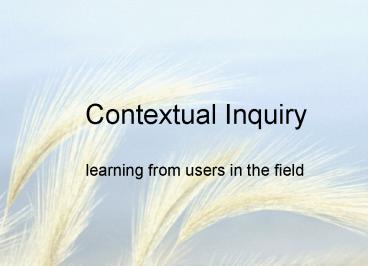Contextual Inquiry PowerPoint PPT Presentation
1 / 27
Title: Contextual Inquiry
1
Contextual Inquiry
- learning from users in the field
2
Agenda
- Questions?
- Learning from users
- contextual inquiry
- observation
- interview
- overview of other techniques
- field study must-haves
3
What is field work?
4
Starting field work
- What do you know?
- Domain knowledge
- Assumptions
5
Starting field work
- Where not to start
- Marketing data
- Detailed surveys
- Jumping into design
- Asking the customer
6
Knowing your user
- Goals are to
- Understand underlying structure / goals / values
- Enable tech transfer
- Make tacit knowledge explicit
7
Tacit/Implicit knowledge
- Stuff that you know, but that you dont know you
know - Important to reveal as much as possible because
designs need to support it
8
Contextual Inquiry overview
- Field study technique
- Hugh Beyer and Karen Holtzblatt InContext
Enterprises - Roots in ethnography from sociology
- Basis of Contextual Design
9
Features of Contextual Inquiry
- Conversations/interviews
- Observations
- Takes place in context.
- Focus is on understanding processes while they
are ongoing
10
Translations for projects
- Customer User
- Work Task(s)
11
Why Contextual Inquiry?
- System design is the goal
- Understand peoples tasks in depth
- Surveys and formal interviews are insufficient
- Builds relationship with users
12
Apprentice model
- The user is the expert
- The designer is there to learn
13
Why be the apprentice?
- Researcher/designer is less threatening
- Not there to judge, evaluate, or test
- People like to talk about themselves when someone
else thinks theyre interesting! - Helps get rid of your own assumptions
14
Learning in context
- User teaches by doing and talking
- People explain best while they are doing a task
- Prevents generalization
- Implicit knowledge can become explicit
15
Finding structure
- Users see tasks and experiences
- Designers identify and abstract patterns,
strategies, structures from user info - Designers seek to understand how structures
relate to goals, environment, other factors
16
Communicating structure
- Designers build explanations or mental models
- Designers should verify interpretations with
users to avoid costly mistakes
17
Pitfalls
- Formal interview style
- Keep questions grounded in ongoing tasks
- Users reveal what is important by what they
choose to talk about - Users talking abstractly
- Loses detail, loses tacit knowledge
- Dismissing unusual information
18
Limitations of Contextual Inquiry
- Large sample populations are infeasible
- Can only see slices of an individuals tasks
19
Will you use Contextual Inquiry?
- Maybe you will, maybe you wont
- Depends on access, tasks
- Not always appropriate
- Many guidelines still applicable
20
Observation
- You just landed on planet X
- Teach someone to drive in a conf room
- Lots of non-verbal details
- Listen to the language (jargon)
- Videotaping
21
Interviews
- Observation grounds interviews
- Keeping the interview open
- Cheat sheets
- Avoid summaries, abstractions
- Create interpretations together
- Tape recording
22
Ethnography a related technique
23
Participatory Design
- Intersperses design activities with data
gathering - Involves users
- Maximizes use of users expertise
- Users dont always know what they need
24
Other techniques
- Exercises
- Sorting, ordering
- Focus groups
- Reaction to prototypes
- Surveys
- Detailed data, evaluation
25
Triangulation
- Multiple viewpoints
- Different types of data
- Discover bias
- Better data
- Shared understanding
26
Consent
- Subjects informed agreement
- What will happen?
- What are the benefits / risks?
- Withdrawal at any time is allowed
- Guardian consent
27
Upcoming
- Monday Task Analysis
- DFAB Ch. 7

